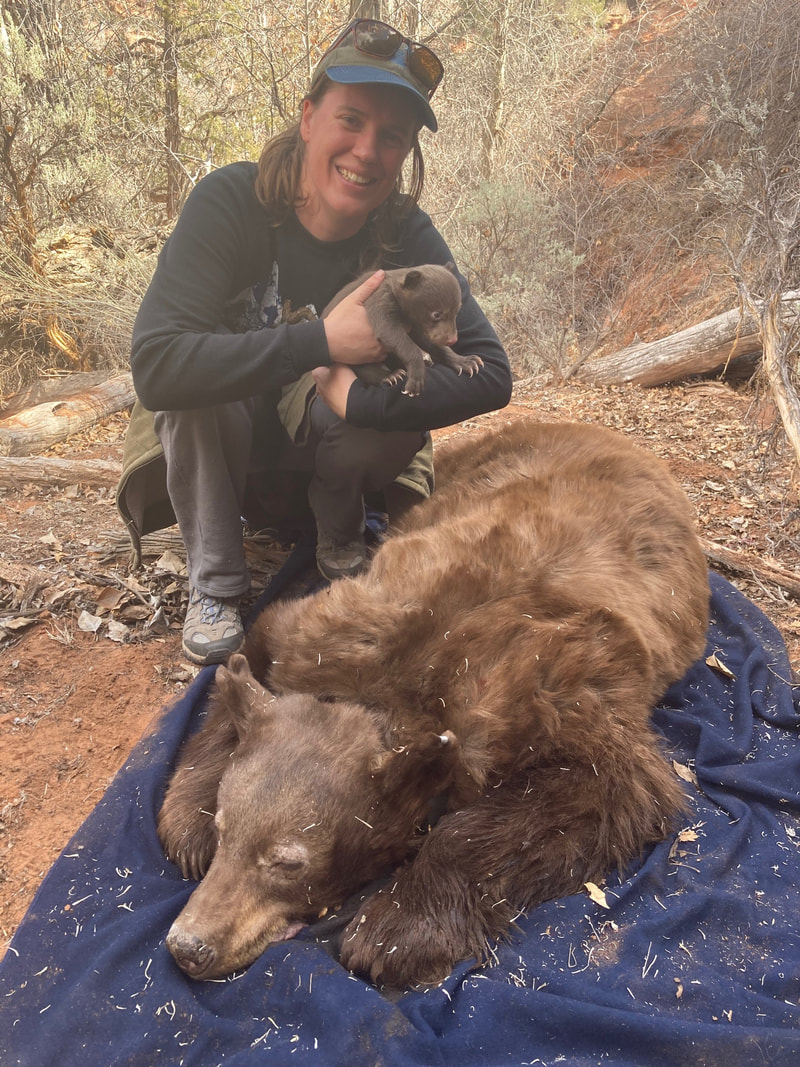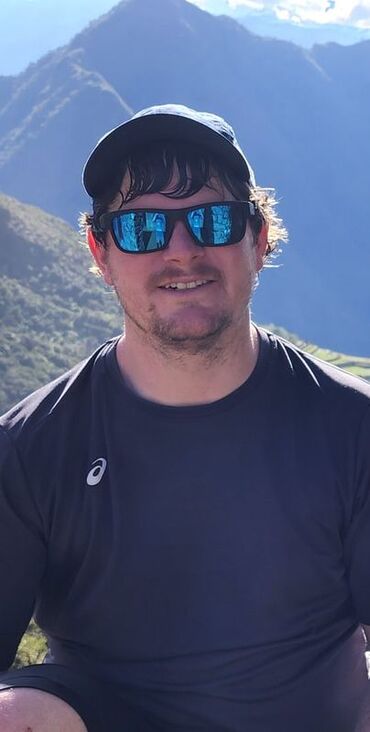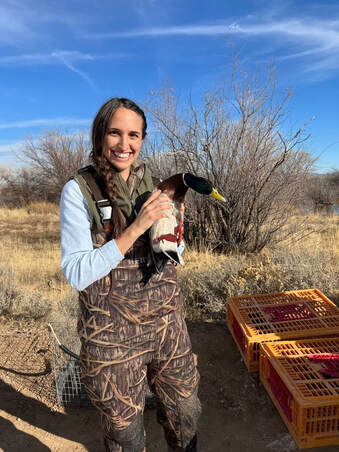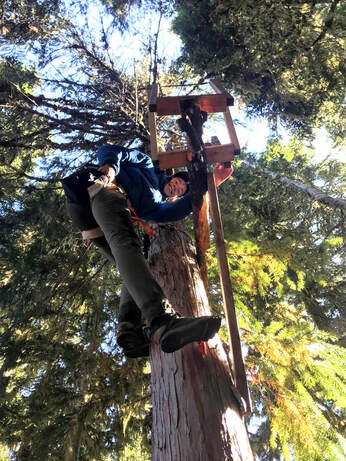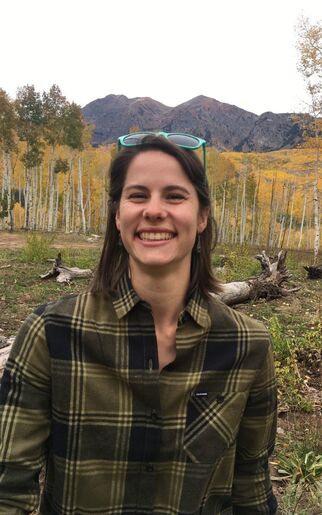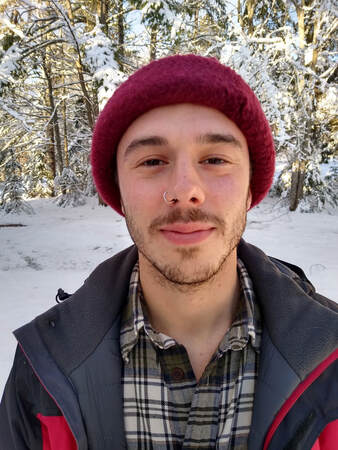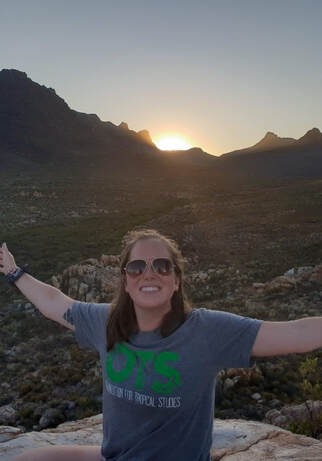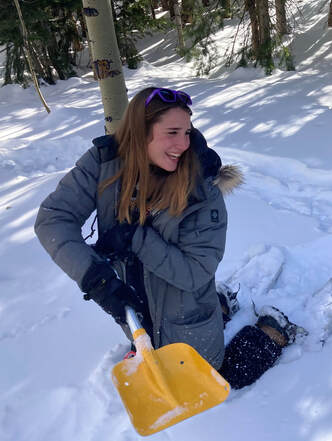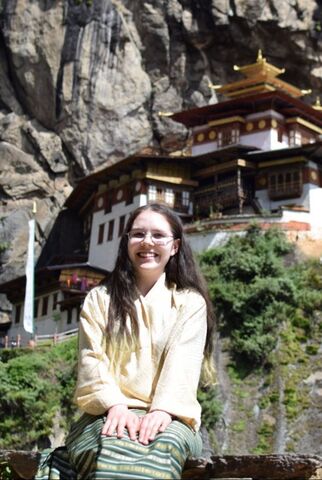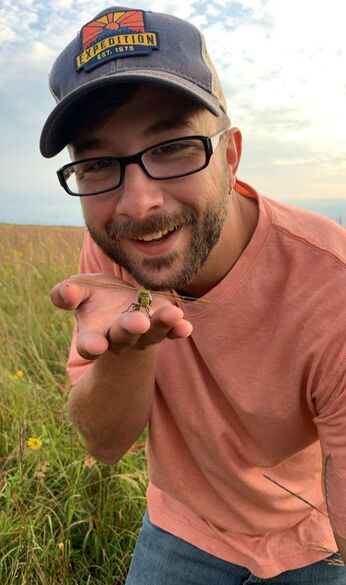Western Wildlife Lab Members:
|
Dr. Madelon van de Kerk (she/her) Assistant Professor of Wildlife Ecology Dr. Van de Kerk is a dedicated wildlife ecologist who focuses on quantitative tools and methods that can be applied to advance wildlife management and conservation. She has worked on projects all over the world and the United States, from remote tropical islands in Indonesia to large game reserves in South Africa, and from Everglades National Park in Florida to the remote wilderness of Alaska. She has researched and published on species in a variety of ecosystems, including mule deer, dall sheep, mountain lions, macaques, black bears, green sea turtles, coral reef fish and brown shrimp. Born and raised in the Netherlands, Dr. Van de Kerk originally moved to the United States in 2011 to study Florida panthers, and fell in love with the Intermountain West soon after. She has been at Western since the summer of 2021, where she teaches students about quantitative techniques in wildlife research and advises graduate students in the M.S. in Ecology program. |
Current students:
|
Taylor Prentice (he/him)
EMPLOYS (MSE & MEM) student Born and raised in the breathtaking landscapes of Colorado, Taylor developed an early passion for the great outdoors and the diverse flora and fauna that inhabit it. This passion led him to pursue a degree in Ecology and Evolutionary Biology at the University of Colorado, Boulder, graduating in December 2014. Since then, Taylor has amassed extensive field experience across various regions, including conducting spotted owl surveys in New Mexico, Arizona, and Oregon, engaging in prairie dog conservation efforts in Boulder, Colorado, and undertaking numerous soil and vegetation surveys for the Bureau of Land Management (BLM). With a strong foundation in field research and a deep commitment to environmental conservation, Taylor returned to graduate school with the goal of further honing his skills. He is driven by the hope of leveraging data-driven approaches to inform conservation and management decisions that will safeguard our ecosystems in a rapidly changing world. At the Western Wildlife Lab, Taylor continues to contribute his expertise towards advancing our understanding and preservation of wildlife and their habitats. Currently he is trying to utilize nearly a decade worth of data to help determine if small mammal species found on the Crane trust are acting as ecological specialist or generalist to help guide management practices to benefit the wide array of important species found on the Crane Trust property in Nebraska. |
|
Sabrina Lucero (she/her)
EMPLOYS (MSE & MEM) student Coming from southern New Mexico, Sabrina received her BS in Fisheries and Wildlife Conservation Ecology from New Mexico State University. She has had the opportunity to work with several different species ranging from chipmunks to large ungulates, to wolves, and to ducks and raptors. Learning to manage wildlife and limit human/wildlife conflict is her goal. Sabrina's thesis focuses on how recreation affects ungulate behavior in the Gunnison Valley. Observational data will be gathered near trails where ungulates are often seen. |
|
Tim Andrews (he/him)
EMPLOYS (MSE & MEM) student Passionate about incorporating big data into ecological research, Tim graduated from Case Western Reserve University with a B.S. in Systems Biology and a minor in Applied Data Science. Since graduating, however, he has enjoyed the opportunity to get his hands dirty and work in the field on a variety of research projects centered on finding better ways to protect at-risk species facing ecological and environmental stressors. Tim is eager to combine these field and computational approaches to research, inform, and implement effective conservation measures while part of the EMPLOYS Traineeship. Tim’s thesis research centers around using GPS data to understand the impacts of conifer bark beetle kill on ungulate movement and distribution in Colorado. |
Alumni:
|
Corinne Ryan (she/her)
MS in Ecology 2023 Despite her tragically urban upbringing, Corinne's enthusiasm for wildlife and the outdoors came naturally to her. She earned a BS in Fish, Wildlife, and Conservation Biology from Colorado State University in 2017. Corinne is highly interested in the confluence of land preservation, wildlife conservation, and sustainable development, as well as integrating diversity, equity, and inclusivity into all facets of the ecological field. She has pursued these interests through a variety of experiences, including wildlife rehabilitation in Costa Rica, permaculture farming in Oregon and Colorado, and wilderness administration in Southeast Alaska. Corinne's thesis research focused on investigating habitat requirements of sensitive high-elevation bat species to determine how elevation, habitat type, and human disturbance influence occupancy and identify ways in which we can help increase resilience of these species. |
|
Dylan Samson-McKenna (he/him) MS in Ecology 2023 Originally from rural Maine, Dylan’s interest in wildlife ecology came naturally to him. He received his BS in Conservation Biology from the University of Vermont in 2019. He has also worked as a wildlife researcher with several state agencies, nonprofits, and universities throughout the U.S. and Central America. As a graduate student, Dylan is interested in large mammal spatial ecology, landscape use change, and management of endangered and elusive species. Dylan's thesis examined the changing occupancy of Baird’s tapir (Tapirus bairdii) as it relates to human presence and land use change in Cusuco National Park, Honduras. |
|
Melissa Jernakoff (she/her) MS in Ecology 2023 Melissa earned her B.S. in Environmental Science from Wheaton College (MA) in 2021, and is currently pursuing a M.S. in Ecology here at Western. Her research interests include wildlife conservation, understanding habitat usage and population dynamics, and assessing anthropogenic impacts. She has worked with a variety of taxa, but is particularly interested in birds and carnivorous mammals. Melissa's thesis research involved collaborating with the Bureau of Land Management to estimate the density of snowshoe hares via pellet-count surveys in the North Powderhorn Wilderness, a critical prey source for supporting a reintroduced Canada lynx population. |
|
Amanda Aulenbach (she/her) MS in Ecology 2023 Originally from Pennsylvania, Amanda received her BS in Biology from Bloomsburg University in 2020. She worked as a natural resource specialist/park ranger for the Army Corps of Engineers and volunteered with a variety of state and private agencies. Her personality trait is her dalmatian, Charlie. As a graduate student, Amanda is interested in wetland and riparian ecology and management of wildlife. Amanda's thesis examined current and historic beaver occupancy in Taylor Park, Almont, Colorado, and identifying the drivers of their recent decline. |
|
Mia MacNeil (she/her)
Master of Environmental Management 2023 Originally from California, Mia learned to love nature and wildlife from her family. She graduated from University of California Davis in 2019 with a BS in Environmental Policy Analysis and Planning, conservation management. She interned with the UC Davis Center for Road Ecology to identify species for a noise and light impact PhD study. She also identified prey species and behavior of Northern Harriers for her internship with the USGS Davis field office based PhD project. Moving forward Mia would like to work on projects with habitat connectivity, large mammals, conservation, and spatial ecology. Pictured is Mia at Tiger’s Nest during her study abroad in the kingdom of Bhutan. Mia's MEM project focused on collecting baseline data for BDA wetland restoration and creating a monitoring plan. |
|
Joshua Wiese (he/him)
Master of Environmental Management (2022) Growing up in the heartland of southcentral Nebraska, Josh has dedicated his career to the studying and restoration native prairies lost to agriculture. Josh received his B.S. in Wildlife Biology from the University of Nebraska-Kearney in 2016. His undergraduate work focused on plant systematics and phylogenetics of the mint genus Agastache, while assisting with research on fish diet preferences and studies of the endangered American Burying Beetle. He currently works at the Crane Trust as the Habitat Ecologist, studying the long term responses of flora and fauna to grassland management. Josh's MEM project focused on working through stakeholder meetings and using original data to develop a Comprehensive Bison Management and Research Plan for the reintroduced bison herd at the Crane Trust. His plan focused on the ecological benefits of bison reintroduction and managing bison for the betterment of native biodiversity. The plan also focused on the larger ecological recovery of bison as a species, including genetic and health management strategies. |
